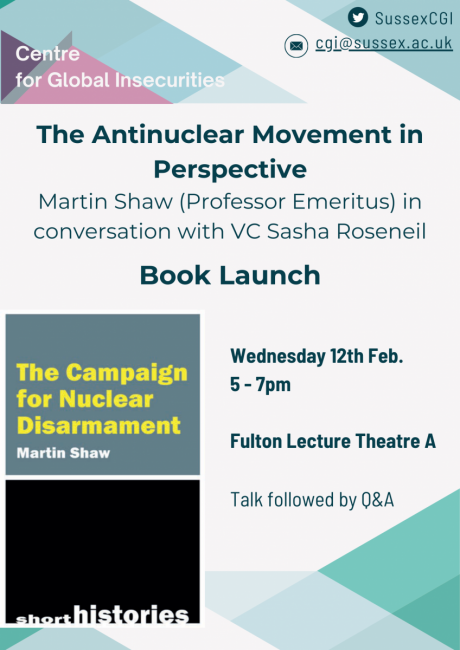Events
No items are currently available.
Upcoming -
'Against a Military Transition: War, Climate Breakdown and Reparative Action' - Advocacy Talk with Khem Rogaly (Common Wealth) and Nico Edwards (University of Sussex)
Date: Thursday 6 February, 3 - 5pm
Venue: Global Studies Resource Centre, Arts C Building
The world’s most powerful states are arming themselves to the teeth. Amid escalating geopolitical conflict and competition, global military spending has hit record levels. At the same time, the climate crisis is nearing points of no return: the world is on track for 1.5 degrees of warming within the next five years; loss and damage funds are totally inadequate; and the US, UK and EU’s green programmes lack ambition and coordination as well as due attention to climate injustices. At this juncture - with global temperatures and military spending reaching simultaneous all-time highs - what are the implications of rising militarism for a world that needs coordinated mitigation and adaptation to the climate crisis?
Military establishments have developed one answer to this question: from Brussels to Washington, Western militaries are positioning themselves as solutions to the climate crisis. This project of military adaptation is founded on two strategic fictions: first, that Western military power must be expanded and repurposed to govern climate chaos; and second, that materiel and operations can be made “green” to maintain military superiority in a net zero world.
These fictions conceal the reality of the West’s military power, disguising it as a route to peacekeeping in a dystopian future, rather than a primary source of ecological damage. Attempts to maintain Western military superiority are also an unstable basis to coordinate a global transition to new modes of organising production and consumption. Decades of overseas interventions and a US-sanctioned genocide in Gaza exemplify the global instability produced by US - and by extension NATO - empire, while Cold War-style tension between US and China promotes ruthless competition over perceived economic interests, tying climate investments to geopolitical competition rather than cooperation towards deep decarbonisation.
A serious project to address climate breakdown instead requires understanding the position of Western militaries at the root of an unequal global order, along with their role as historic defenders of fossil fuel interests. An industrial transition from the production of military equipment to social and ecological goods is an example of a solution that addresses the economic order and its militaristic foundations (extractivism and militarism) at once. Rather than accept Western militaries as capable of “climate action”, real solutions to social and ecological crises reckon with their role in engineering and maintaining fossil empire. Redirecting state support from military industries to international climate finance and a just transition for arms workers are essential steps in the right direction. The just transition demands a drawdown, not the expansion, of military power.
Please see the attached for information on further reading.
'The Antinuclear Movement in Perspective' - Martin Shaw in conversation with Sasha Roseneil
Date: Wednesday 12 February, 5pm-7pm
Venue: Fulton A Lecture Theatre
As nuclear weapons rise up the international agenda, Martin Shaw will be talking about his new book The Campaign for Nuclear Disarmament (Agenda Publishing), the first academic study of the movement in Britain to be published this century, with Sasha Roseneil, author of Disarming Patriarchy: Feminism and Political Action at Greenham (Open University Press, 1995), and Common Women, Uncommon Practices: the Queer Feminisms of Greenham (Cassell/Bloomsbury, 2000).
The movement against nuclear weapons was the first postwar mass protest movement in Britain and the discussion will include the roles of social movements and the intersections between them as well as the current politics of nuclear weapons. In addition to their academic research, both speakers were participants in the 1980s peace movement, Martin in European Nuclear Disarmament and CND and Sasha in the Greenham Common women's peace camp.
Martin Shaw is Emeritus Professor of International Relations and Politics and Sasha Roseneil is Vice-Chancellor at the University of Sussex.
